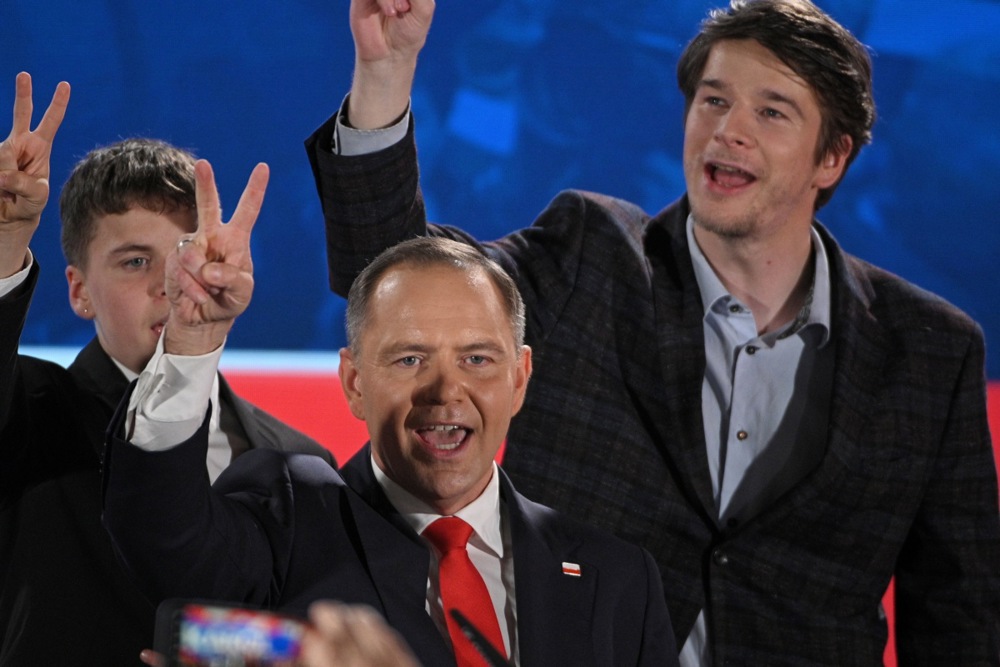The disadvantages faced by the opposition candidate Karol Nawrocki in Poland’s recent election campaign, which he managed to win against the odds, have been highlighted in a report by the Organisation for Security and Co-operation in Europe (OSCE).
Nawrocki, from the opposition Conservatives (PiS), won the presidential election run-off on June 1 with 51 per cent of the vote against 49 per cent for Rafał Trzaskowski, the candidate supported by the centre-left government led by prime minister Donald Tusk.
The PiS candidate had trailed in the opinion polls throughout the campaign. He had to fight off a series of unsubstantiated allegations about past associations with criminals, pimping, football hooliganism and the acquisition of a small property by deception.
The OSCE report published on June 3 did acknowledge that the elections, which recorded a 72 per cent voter turnout, was “competitive and well managed” and that “fundamental freedoms were respected”.
Despite that, the observers mission authors highlighted among other things what they called inadequate regulations on campaign financing. That allowed the publication of propaganda material for Trzaskowski that did not have to be accounted for, partisan involvement by public officials in campaigning for him and bias in the public media controlled by the government against the opposition candidate, the OSCE said.
Contrary to its mandate, public television station TVP, along with the US Discovery-owned broadcaster TVN and the German-Swiss owned portal Onet, often portrayed Nawrocki in a negative manner, while the coverage of Trzaskowski was largely uncritical and supportive, the report stated.
The OSCE also recorded doubts over campaign financing, with the main concern being “insufficient campaign finance regulations, including lack of reporting requirements before the second round and absence of third-party campaigning provisions”.
The report stated that “several third parties, including civil society organisations, engaging in election observation and voter mobilisation activities, conducted campaigns incurring significant expenditures” in favour of Trzaskowski.
It pointed to two new Facebook profiles that, from April 16 to May 14, raised around €100,000 for 136 video ads on Facebook in favour of Trzaskowski and against Nawrocki and Sławomir Mentzen, the Confederation party candidate who finished third in the ballot’s first round.
The OSCE added that both profiles were later referred to Poland’s Internal Security Agency (ABW) for investigation.
It said, though, the handling of the case by public institutions including NASK, a Polish State research institute tasked with monitoring cyberthreats, “raised concerns” of bias in favour of the government’s candidate and against Nawrocki.
The report also criticised “the delayed and contradictory public communications and the lack of transparency regarding findings and measures taken” and pointed out that it may have negatively impacted public trust in the institutions involved.
The OSCE also noted ongoing issues with the legal system in Poland, pointing to the controversy surrounding the Supreme Court.
The Tusk government in 2024 refused to honour that court’s order to pay the PiS’ state funding, which disadvantaged the party in the presidential campaign. The party did manage to make up the shortfall from donations from members of the public.
The OSCE stopped short of exploring the PiS allegations of security services’ involvement in releasing negative information about Nawrocki or of Tusk urging the media to “reveal all” about the PiS candidate ahead of the election’s decisive second round.
Commenting on the OSCE report, the founder of Poland’s most popular YouTube channel Kanał Zero, Krzysztof Stanowski said: “It is an indictment of the Trzaskowski campaign as it clearly demonstrates that the odds were stacked heavily in its favour but it still contrived to lose.”
The document followed another released after the first round of the election on May 20 that pointed to a “highly polarised political environment” and a media landscape that, in OSCE mission’s opinion, “limited voters’ access to impartial information”.





